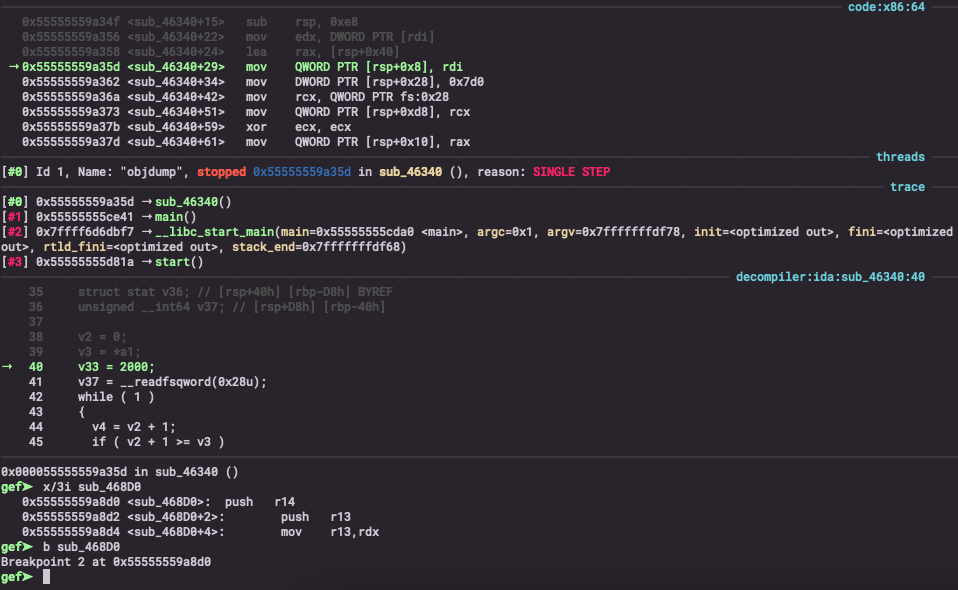decomp2gef
A plugin to introduce a generic API for decompiler usage and syncing in GDB with the help of the GEF plugin.
Install (script/fast)
The easiest and fastest way to install is using the install.sh script!
./install.sh --ida /path/to/ida/pluginsMake sure to define the correct option for your decompiler of choice. Use --help for more info!
Note: You may need to allow inbound connections on port 3662, or the port you use, for decomp2gef to connect
to the decompiler.
Install (manual)
If you can't use the script (non-WSL Windows install for the decompiler), follow the steps below:
If you only need the decompiler side of things, copy the associated decompiler plugin to the decompiler's plugin folder. Here is how you do it in IDA:
Copy all the files in ./decompilers/d2g_ida/ into your ida plugins folder:
cp -r ./decompilers/d2g_ida/* /path/to/ida/plugins/If you also need to install the gdb side of things, use the line below:
pip3 install . && \
cp decomp2gef.py ~/.decomp2gef.py && echo "source ~/.decomp2gef.py" >> ~/.gdbinitUsage
First, start the decompilation server on your decompiler. This can be done by using the hotkey Ctrl-Shift-D,
or selecting the decomp2GEF: configure tab in your associated plugins tab (under Tools in Binja). After starting the server, you should
see a message in your decompiler
[+] Starting XMLRPC server: localhost:3662
[+] Registered decompilation server!
Next, in gdb, run:
decompiler connect <decompiler_name>If you are running the decompiler on a VM or different machine, you can optionally provide the host and port to connect to. Here is an example:
decompiler connect ida 10.211.55.2 3662First connection can take up to 30 seconds to register depending on the amount of globals in the binary. If all is well, you should see:
[+] Connected to decompiler!Decompilation View
On each breakpoint event, you will now see decompilation printed, and the line you are on associated with the break address.
Functions and Global Vars
Functions and Global Vars from your decompilation are now mapped into your GDB like normal Source-level symbols. This means normal GDB commands like printing and examination are native:
b sub_46340
x/10i sub_46340p dword_267A2C
x dword_267A2CStack Variables and Function Args
Some variables that are stored locally in a function are stack variables. For the vars that can be mapped to the stack, we import them as convenience variables. You can see their contents like a normal GDB convenience variable:
p $v4Stack variables will always store their address on the stack. To see what value is actually in that stack variable, simply dereference the variable:
x $v4This also works with function arguments if applicable (mileage may vary):
p $a1Note: $v4 in this case will only be mapped for as long as you are in the same function. Once you leave the function
it may be unmapped or remapped to another value.
Features
- Auto-updating decompilation context view
- Auto-syncing function names
- Breakable/Inspectable symbols
- Auto-syncing stack variable names
- Auto-syncing structs
Abstract
The reverse engineering process often involves a decompiler, making it fundamental to support in a debugger since context switching knowledge between the two is hard. Decompilers have a lot in common. During the reversing process there are reverse engineering artifacts (REA). These REAs are common across all decompilers:
- stack variables
- global variables
- structs
- enums
- function headers (name, ret type, args)
- comments
Knowledge of REAs can be used to do lots of things, like sync REAs across decompilers or create a common interface for a debugger to display decompilation information. GEF is currently one of the best gdb upgrades making it a perfect place to first implement this idea. In the future, it should be easily transferable to any debugger supporting python3.

